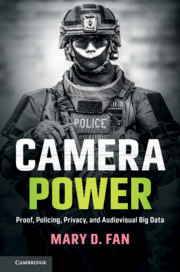Book contents
- Camera Power
- Camera Power
- Copyright page
- Dedication
- Contents
- Figures
- Tables
- Acknowledgments
- Introduction
- Part I Toutveillance Power and Police Control
- Part II Audiovisual Big Data’s Great Potential and Perils
- Part III Frameworks for Moving Forward
- 7 Controlled Access, Privacy Protection Planning, and Data Retention
- 8 Nonrecording and Officer Monitoring and Discipline Dilemmas
- Conclusion
- Appendix The Collection and Coding of 213 Body Camera Policies
- Index
7 - Controlled Access, Privacy Protection Planning, and Data Retention
from Part III - Frameworks for Moving Forward
Published online by Cambridge University Press: 03 May 2019
- Camera Power
- Camera Power
- Copyright page
- Dedication
- Contents
- Figures
- Tables
- Acknowledgments
- Introduction
- Part I Toutveillance Power and Police Control
- Part II Audiovisual Big Data’s Great Potential and Perils
- Part III Frameworks for Moving Forward
- 7 Controlled Access, Privacy Protection Planning, and Data Retention
- 8 Nonrecording and Officer Monitoring and Discipline Dilemmas
- Conclusion
- Appendix The Collection and Coding of 213 Body Camera Policies
- Index
Summary
- Type
- Chapter
- Information
- Camera PowerProof, Policing, Privacy, and Audiovisual Big Data, pp. 195 - 214Publisher: Cambridge University PressPrint publication year: 2019



